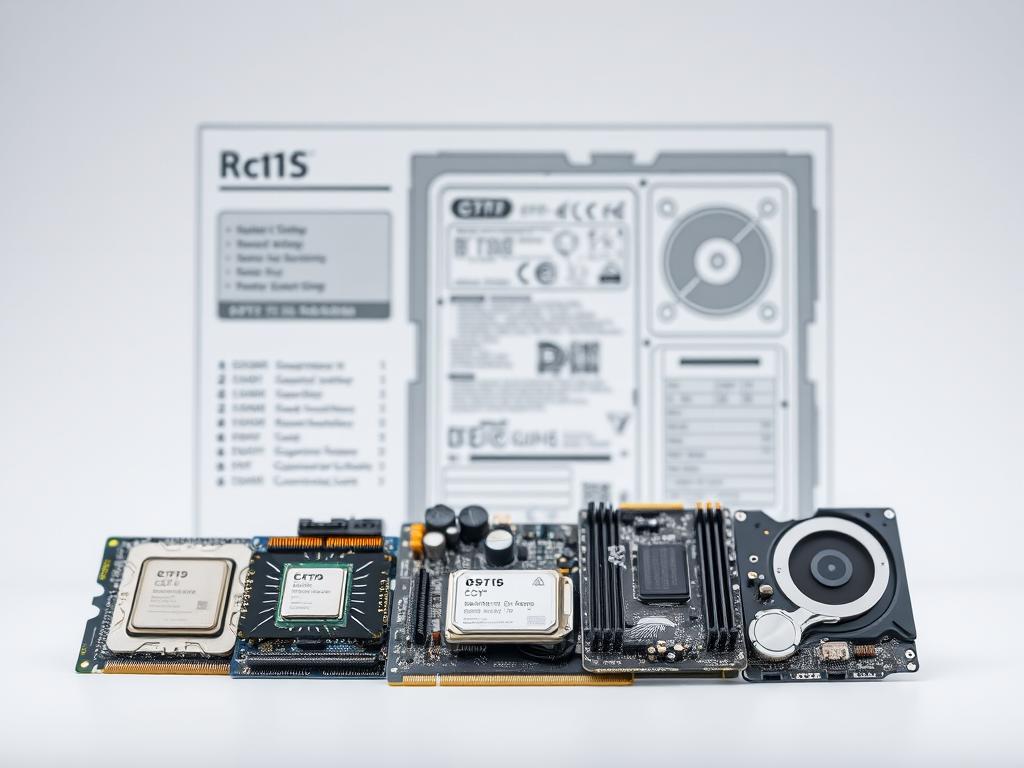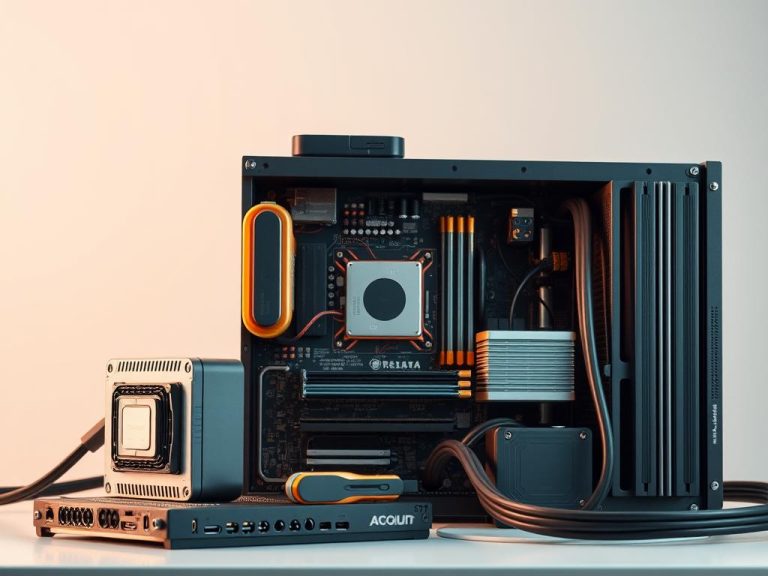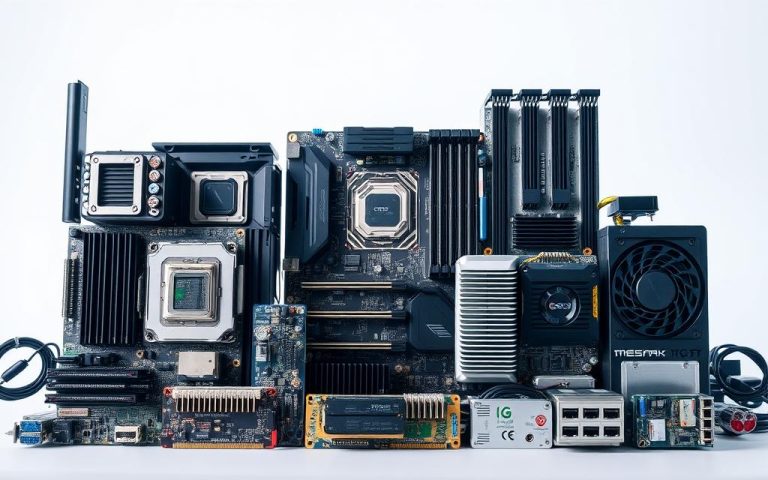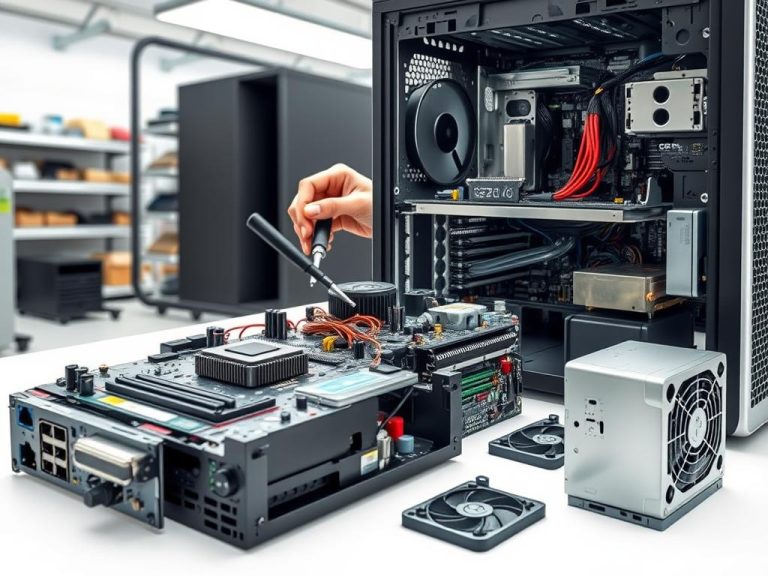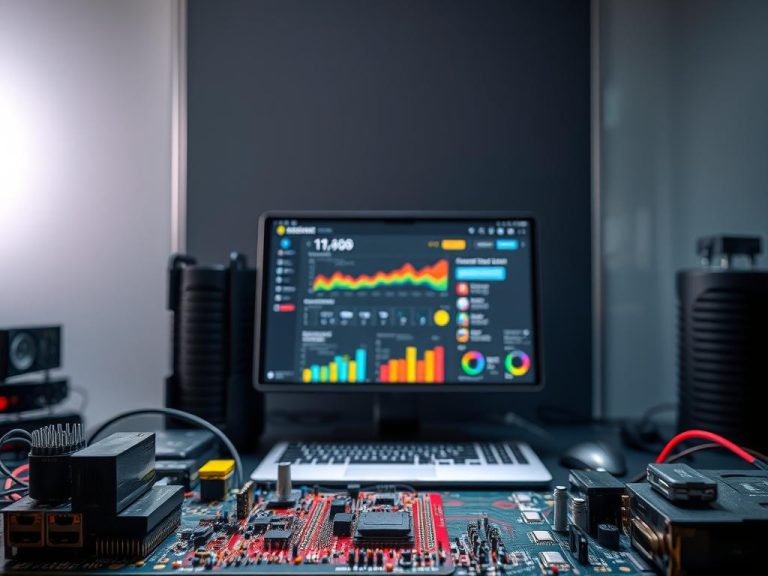How to Check What Hardware Your Computer Has
Knowing your computer’s hardware specs is vital for top performance and smart upgrades. PC specs give a full picture of your system’s inner workings. This includes the processor, memory, and storage abilities.
Finding out about your computer’s hardware is easier than you might think. With the right tools, you can uncover detailed system information about your device. Modern computers have many parts that work as a team.
Understanding your PC’s hardware helps you grasp its full potential. The Crucial System Scanner is a handy tool for this. It offers info on over 110,000 systems.
Each operating system has its own way to show hardware details. Windows 10 and 11 users can find this in the Start menu and Settings. Mac users can view specs by clicking the Apple icon.
This guide will show you how to find and understand your computer’s hardware specs. You’ll learn to make smart choices about your system’s abilities and possible upgrades.
Understanding PC Hardware Specifications and Their Importance
Computer hardware can be tricky to grasp. Yet, knowing your system’s parts is key for top performance. These components are the core of how well your device works.
This applies to casual users and professionals alike. Each part plays a vital role in how your system runs.
Hardware is crucial to your computer’s performance. All parts work together for smooth computing. Knowing these specs helps you make smart choices about upgrades and compatibility.
Essential Hardware Components
- Processor (CPU): The brain of your computer, determining processing speed
- Graphics Card (GPU): Manages visual rendering and graphics performance
- Random Access Memory (RAM): Supports multitasking and application performance
- Storage Drives: Manage data storage and retrieval
Performance Considerations
Different hardware setups greatly affect system performance. Processors from 2.4 GHz to 3.5 GHz can hugely impact speed. Quad-core processors with multiple threads outperform simpler ones.
A computer is only as powerful as its weakest component.
Hardware Specification Insights
- 8 GB RAM recommended for multitasking
- 16 GB RAM optimal for intensive applications
- SSD drives provide faster performance than traditional HDDs
- Graphics cards crucial for gaming and visual work
Understanding your computer’s hardware specs is vital. It helps you boost performance and solve issues. You can also make smart upgrade choices to improve your computing experience.
Built-in Windows Tools for Hardware Checking
Windows offers powerful tools to explore your computer’s hardware specs. The System Information and Device Manager provide insights into your PC’s components. These tools make it easy to understand your device’s capabilities.
Users can access hardware info through various methods. These include Windows Settings About page, System Information tool, Device Manager, and Command Prompt.
The About page in Windows Settings gives a quick overview of essential hardware details. It shows processor type, installed memory (RAM), system specs, and Windows installation details.
- Processor type
- Installed memory (RAM)
- System specifications
- Windows installation details
Device Manager offers an in-depth look at installed hardware components. It allows users to view details about various hardware categories.
| Hardware Category | Information Available |
|---|---|
| Processors | Model, speed, cores |
| Graphics Cards | Manufacturer, model, driver version |
| Storage Devices | Drive types, capacities |
| Network Adapters | Connection types, manufacturers |
These built-in Windows tools provide comprehensive information for most users. However, they may have limitations for those seeking extremely detailed hardware diagnostics. Advanced users might need third-party software for more in-depth analysis.
What Is My Computer Hardware: Essential Components to Check
Knowing your computer’s hardware is vital for top performance. Modern computers have key parts working together to deliver computing power. Let’s explore the essential hardware specs every user should know.
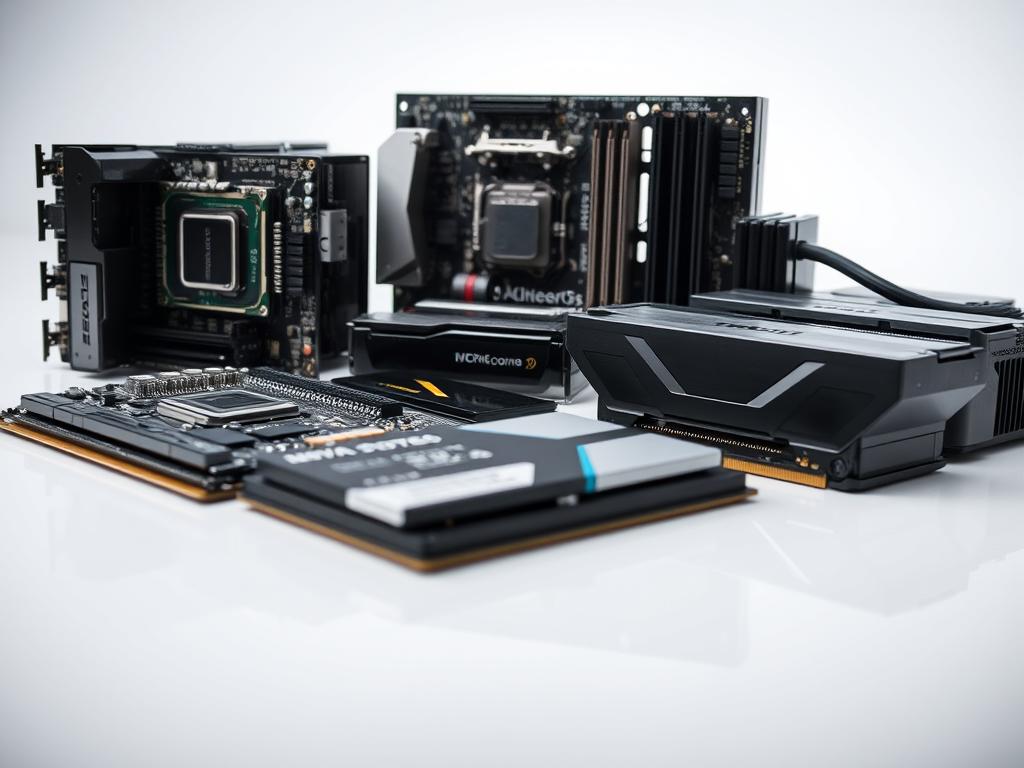
Checking hardware specs reveals your computer’s abilities and limits. We’ll look at the critical components you should examine.
Processor (CPU) Specifications
The CPU is your computer’s brain. It handles complex calculations and instructions. When looking at CPU specs, focus on these key aspects:
- Number of cores
- Clock speed
- Generation of processor
- Cache memory
Graphics Card (GPU) Details
GPUs are crucial for visual rendering. They’re especially important in gaming and graphic design. Key GPU details to check include:
- VRAM capacity
- Graphics card model
- Memory bandwidth
- Supported display resolutions
Memory (RAM) Configuration
RAM affects your computer’s multitasking abilities. When examining RAM configuration, consider these factors:
- Total memory capacity
- RAM type (DDR4 or DDR5)
- Memory speed
- Number of memory slots used
Storage Drives Information
Storage drives impact system speed and data storage. To evaluate your storage info, check these aspects:
- Drive type (HDD or SSD)
- Total storage capacity
- Available free space
- Read/write speeds
Knowing these hardware specs helps you make smart choices. You can decide on upgrades, solve problems, and boost performance.
Using Online System Scanners and Diagnostic Tools
Online hardware checker tools swiftly diagnose your computer’s specs. They reveal details about your device’s components without needing technical expertise. These system scanners are efficient and user-friendly.
When choosing an online PC diagnostics tool, look for these features:
- Comprehensive scanning capabilities
- User-friendly interface
- Compatibility with multiple operating systems
- Security and privacy protection
Several top-notch online system scanner tools are available:
| Tool Name | Primary Features | Best For |
|---|---|---|
| Crucial System Scanner | Detailed hardware analysis | Component compatibility checks |
| CPU-Z | Processor and memory details | Precise hardware specifications |
| Speccy | Comprehensive system information | In-depth hardware reporting |
Most online hardware checkers offer instant results without software installation. They help users understand their system setup. These tools can also spot potential upgrade options.
Always download from official websites when using these tools. This ensures data privacy and prevents security risks.
Advanced Methods for Hardware Investigation
Sophisticated hardware investigation techniques reveal detailed insights about computer components. Modern technology offers multiple approaches to extract comprehensive hardware information. These go beyond basic system interfaces.
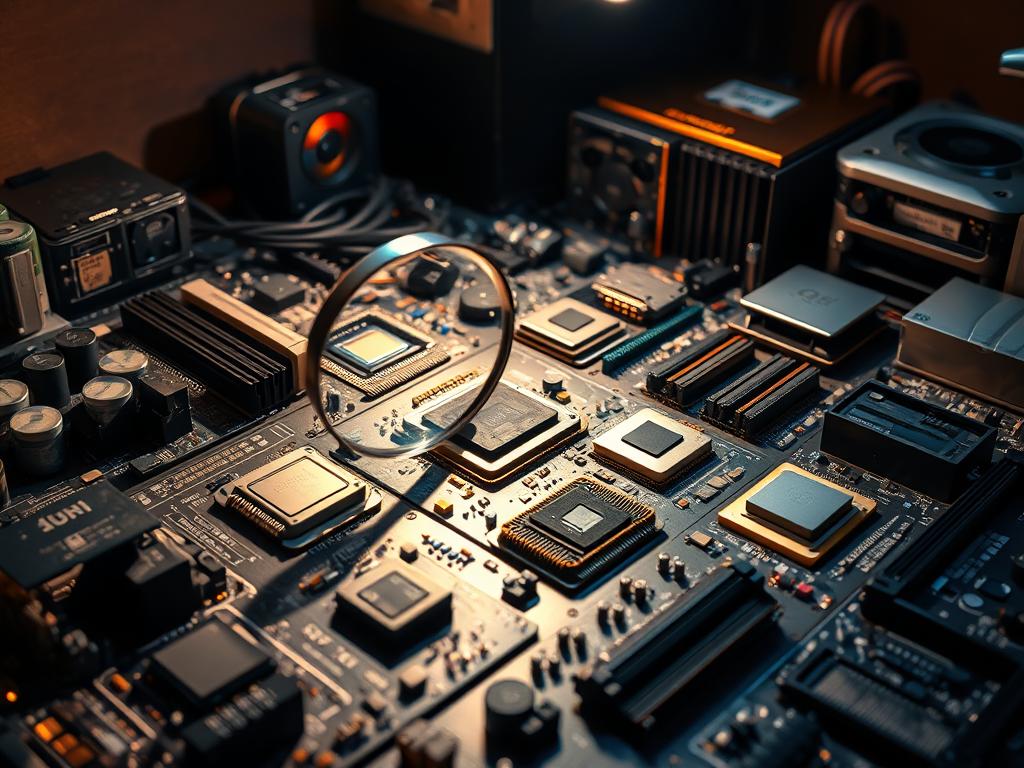
Professional hardware investigation uses built-in Windows tools and specialised software solutions. These methods provide granular details about system specifications. Such information helps diagnose issues, plan upgrades, and troubleshoot problems.
PowerShell Commands for Hardware Details
PowerShell commands quickly retrieve hardware information. Users can run specific scripts to extract precise system details:
- Get-WmiObject Win32_Processor: Retrieves CPU specifications
- Get-WmiObject Win32_VideoController: Displays graphics card information
- Get-WmiObject Win32_PhysicalMemory: Shows RAM configuration
Command Prompt Methods
The Command Prompt offers direct hardware investigation methods. Simple commands provide valuable information:
- systeminfo: Generates comprehensive system report
- wmic cpu get name: Displays processor details
- wmic diskdrive get size: Retrieves storage drive information
Third-Party Software Solutions
Various hardware investigation software options offer advanced scanning capabilities. These tools provide in-depth analysis of system components.
| Software | Key Features | Best For |
|---|---|---|
| CPU-Z | Detailed processor analysis | Enthusiasts and overclockers |
| HWiNFO | Comprehensive hardware monitoring | Advanced system diagnostics |
| Speccy | User-friendly hardware summary | Casual users |
Each method has unique advantages for hardware investigation. Users can choose the most suitable approach based on their expertise. The choice also depends on specific requirements.
Interpreting Your Hardware Specifications
Grasping hardware specs is vital for assessing your computer’s performance potential. It’s about matching your system’s specs to software requirements. Professional tools can precisely determine your computer’s capabilities.
When checking system requirements, focus on processor speed, RAM, and graphics card performance. Tools like Speccy, CPU-Z, and HWMonitor offer detailed insights into these specs. These utilities help compare hardware against benchmarks for various applications.
Understanding component interactions simplifies performance analysis. A powerful CPU with limited RAM may cause system slowdowns. The Crucial System Scanner provides compatibility info for numerous systems.
Regular spec tracking helps maintain peak system performance. Review your computer’s specs often and compare them with new software needs. This approach allows for strategic hardware upgrades, keeping your system efficient.
FAQ
Why are computer hardware specifications important?
Hardware specs reveal your computer’s abilities. They ensure software works well and help you decide on upgrades. Knowing your CPU, GPU, RAM, and storage details is crucial for running apps and games smoothly.
How can I quickly check my computer’s hardware specifications in Windows?
Windows offers built-in tools to check hardware specs. Use the About page in Settings, System Information, or Device Manager. These provide details about your computer’s components, processor, memory, and installed hardware.
What are the key hardware components I should be aware of?
The most important hardware parts are the CPU, GPU, RAM, and storage drives. Each plays a vital role in your computer’s performance. They determine how well your system handles various tasks.
Are online system scanners safe to use?
Trusted websites offer safe online system scanners. These tools give detailed hardware reports without risking your system’s security. They can suggest upgrades and offer helpful insights.
What advanced methods can I use to investigate my hardware?
PowerShell and Command Prompt commands offer in-depth hardware info. Third-party diagnostic software provides even more technical details. These methods go beyond standard Windows tools for thorough analysis.
How do I know if my hardware can run specific software or games?
Check your hardware specs against the software’s requirements. Look at processor speed, RAM, graphics card, and storage space. This comparison helps you determine if your system can handle the program.
How often should I check my computer’s hardware specifications?
Review your hardware specs yearly or when issues arise. It’s also wise to check before upgrading software. Consider a review when planning to install resource-heavy applications.
Can I upgrade individual hardware components?
Many computers allow upgrades to RAM and storage drives. Some let you change the graphics card too. CPU and motherboard upgrades depend on your system’s design.
What tools can help me diagnose hardware performance issues?
Windows’ Performance Monitor is useful for diagnosing issues. Third-party system analysis software offers deeper insights. Hardware monitoring apps can spot bottlenecks, temperature problems, and performance limits.
How do different hardware components impact computer performance?
Each part affects performance differently. The CPU handles processing tasks. GPUs manage graphics rendering. RAM supports multitasking. Storage drives control data access speeds.
A balanced setup ensures your system runs at its best. This means choosing components that work well together.

